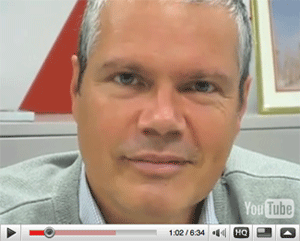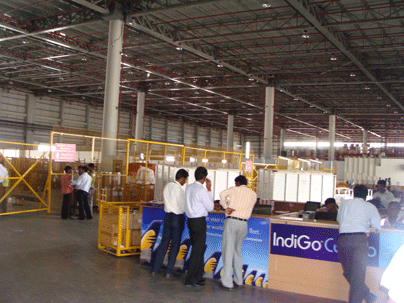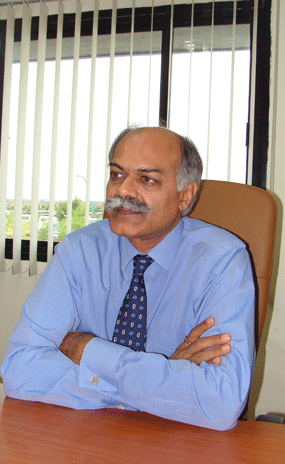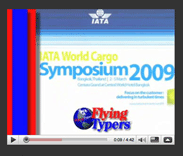

 |
 |
|
| |
||
|
Vol. 8 No. 40 WE COVER THE WORLD Thursday April 9, 2009 |
Late last month what has become
an annual rite of Spring in New York, JFK Air Cargo Day was held with several
hundred industry professionals in attendance.
The event is sponsored and raised by the pioneering
JFK Air Cargo Association that meets monthly at the airport.
We have always liked that air cargo folks can
drive over to an on-field hotel venue, have some lunch, network and maybe even
learn something about what is going on elsewhere in this big wide world, all
in one day.
Here it is about community gathering round and
supporting an air cargo event that makes the going better for everyone.
Once upon a time what happened at JFK air cargo
carried global importance.
Thanks to people like Jim Larsen, Gerry Kash and
others who carried this event forward for many years to get it started, and
now with Willy Mercado from Aer Lingus and others
who continue the effort, JFK Air Cargo Day has a rhythm and motion that is irresistible.
 The event even managed to make some global news
as Oliver Evans, (left) the Chief Cargo Officer at Swiss International Air Lines
delivered an insightful in the moment speech that wrapped up in some plain speaking
what might help others to better understand and make it in air cargo during
2009. (Click
on photo or here to view video).
The event even managed to make some global news
as Oliver Evans, (left) the Chief Cargo Officer at Swiss International Air Lines
delivered an insightful in the moment speech that wrapped up in some plain speaking
what might help others to better understand and make it in air cargo during
2009. (Click
on photo or here to view video).
So in addition to everything else at JFK on March
26, a well respected transportation thinker and top world air cargo executive
delivered for some air cargo people, many of whom have been beaten about the
head by the global financial meltdown.
“Crises means change,”Mr. Evans said.
“Change means opportunity.
“Clear strategy and perfect execution enable
success and growth also in times of crises.
“How will successful carriers and cargo
companies get through these turbulent times?
“My view is that air cargo will be well
served with focus on strategy and continuous investment in future innovations."
Mr. Evans who obviously thinks about these things
makes no secret what has his attention these days.
“It’s about quality focus,”
he says.
“With commitment to Cargo 2000 Swiss WordCargo
continues to strive for high quality.
“The point is that e-age future development
does not stop in times of crises.
“Today message quality and data integrity
are not being utilized enough by the industry. EDI messaging is only partly
in use as many paper/phone/fax transactions continue.
“There is also too many antiquated 30 year-old
legacy systems still in use throughout the air cargo industry. These legacy
systems are costly, slow and difficult to upgrade, offering among other things
unreliable message transfer between systems that compromise quality and create
additional work and delay.
“The first steps into the internet age are
currently being coordinated by IATA (MIP, e freight), however the individual
airlines and other supply chain participants main responsibilities are not just
the simple transition from paper AWB to eAWB—but rather messaging quality,
standardization and connectivity.
“At Swiss WorldCargo we have been constantly
positioning for the “e” or paperless AWB future.
“So our view is that despite the current
downturn much can be done to be ready for the challenges of a changing marketplace
as business returns.
“Looking ahead there are some projections
for five year growth at about four and a half percent with intercontinental
air trade growth between 2008-2012.
“So far in 2009 as we all know lower fuel
costs are not stimulating an upswing in air cargo as the deepest recession since
the 1930’s is forecast for the year.
“The downturn is especially felt in Asia
where big investments into the former booming market have seen directional imbalances
and the global situation have lead to a disaster for almost every airline.
“Right now for air cargo, flights ex-China
account for a huge 90% of the revenue.
“According to reports more than 2800 jet
airliners are now parked with 1167 of those aircraft grounded last year.
“So understanding crises and change while
driving both quality and opportunity will be critical in this most uncommon
time,” Mr. Evans said.
Oliver is an ace.
What’s more we have seen him stand up twice
big time for air cargo this past month, on March 3 in BKK at IATA WCS and again
on March 26 at JFK.
Geoffrey
 (Hyderabad
Exclusive)—It has been
an eventful first year for the Rajiv Gandhi International Airport (also known
as GMR-Hyderabad International Airport Limited or GHIAL) at Hyderabad.
(Hyderabad
Exclusive)—It has been
an eventful first year for the Rajiv Gandhi International Airport (also known
as GMR-Hyderabad International Airport Limited or GHIAL) at Hyderabad.
One of the country’s top Greenfield airports,
GHIAL has become quite popular with the air cargo community in the region.
The cargo facilities and those who are managing
them speak of efficiency and nimbleness.
Ever since the airport started operations, the
management has been hard selling it to both passenger and freight carriers.
Their efforts are paying off – as far as
air cargo goes.
Earlier this week Lufthansa Cargo enhanced its
freighter network in India, with a weekly two-way freighter flight every Tuesday
to Hyderabad from Frankfurt.
This new flight ideally augments the capacities
already available on Lufthansa passenger flights.
With this addition to the network, Lufthansa Cargo
will be the first airline to offer a freighter service to the south Indian metropolis.
Elsewhere cargo authorities here have a two-pronged
strategy to woo the world:
First, promote the facilities available, and second,
promote the potential of the city.
For the moment, Hyderabad is placed sixth or seventh
in terms of India cargo throughput, with more exports out of the city than imports.
Let’s look at facilities at GHIAL.
The international air cargo complex spans an area
of 10 acres, of which three acres have been apportioned for cargo processing
and storage area.
Of the total area of 14,330 sq m, the international
air cargo complex will have 6,610 sq m and the domestic air cargo complex would
have 4,346 sq m.
There is dedicated parking space for 24 trucks,
96 cars and 120 plus two-wheelers.
Managed by a joint venture between the airport
and the UK-based Menzies, the cargo section is a hi-tech facility capable of
handling 100,000 tons annually.
 Said
Dilip Rane, Associate Vice President, Cargo, GHIAL:
Said
Dilip Rane, Associate Vice President, Cargo, GHIAL:
“We are selling the airport facilities to
carriers and showcasing the terminal to the industry. We also have to influence
freight forwarders, shippers and consignees about the airport.
“For a carrier, it has to make economical
sense to fly freighters into an airport. If exports or imports from the airport
are not large enough, carriers would shy away from the airport, however beautiful
the airport is or however good the cargo terminal may be.”
Ultimate aim here without a doubt is to position
Hyderabad as a global cargo hub.
GHIAL management wants to capitalize on the city’s
distinct geographical advantage.
Not only is it connected to other airports in
the country; it is at the center of the important aviation hubs of Singapore
and Dubai airports.
However, the city’s proximity to Nagpur
(a six-hour drive), where a multi-modal cargo hub is being put up, has made
the situation more competitive.
Said Rane:
“We are working on the project that would
transform Hyderabad into a transshipment hub – which is still at the planning
stage.
“We already have Customs permission to transship
cargo in and out of Hyderabad.
“That means a freighter could come in from
London to Hyderabad with cargo destined for Chennai or other destinations in
the south.”
He pointed out that the carriers would choose
Hyderabad “because some of them have been finding it difficult to fly
cargo to Chennai or Bengaluru due to lack of capacity.
“We have capacity available in Hyderabad
because there is not much of import coming in.”
Even so, said Rane, Lufthansa has been the first
to recognize Hyderabad’s potential.
“Most of the airlines we spoke to were satisfied
with exports but imports are dismal.
“Basically, those who are capacity operators
will be attracted to come here.
“Exports out of Hyderabad are 80-85 percent,
while imports only amount to 10-15 percent of total cargo throughputs.
“So, especially for carriers from Europe,
to come all the way more or less empty is not feasible. They can’t recover
the cost of operations.
“Lufthansa has seen that the export market
is good. The aircraft which flies into Mumbai comes with imports. Previously,
the same aircraft used to go to Bangkok. The Mumbai to Bangkok sector hardly
took any cargo. There was, perhaps, only a small amount of pharma goods. Thailand
was hardly importing anything from India. There could be some imports to Hyderabad
but a majority will go to Mumbai.
“Once word about transshipment spreads,
which Lufthansa is aware of, then they can bring cargo destined for Bengaluru
or Chennai and discharged at Hyderabad.”
Other than the proposed transshipment hub, the
cargo complex’s Center for Perishable Cargo (CPC) has been earning its
stripes.
Today, it has a capacity of handling 38 tons of
perishable goods, like fruits, vegetables and flowers.
In addition, it has a further 8 tons of freezer
capacity, which can be used for pharma products or vaccines.
Over the next three or four years, the airport
is building infrastructure that will enable it to handle 13,000 tons per annum
of perishable cargo under Phase-I (up to 2011) and 25,000 tons per year under
Phase-II (2013-14).
Incidentally, the largest export consignments
from Hyderabad comprise pharma and more recently, solar panels.
Ideally, Rane wished to have “least one
airline to be anchored here at Hyderabad.”
Stay tuned.
Tirthankar Ghosh
It’s doubtful four decades ago come this May 15, as Finnair celebrates 40 years of service flying from Helsinki to New York City, that folks on those first DC8-62CF aircraft that served the route experienced the kind of premium seating and service featured aboard AY’s new A330 (OH-LTM -“Mike”) long range aircraft just delivered that now will fly the route.
But in just a bit, over
one month as the A330 makes its run across the Atlantic to mark forty
years of continued service, that is exactly what will happen.
|
Up
Close & Personal |
 |
 |
 |
 |
Re: Remembering The Great Siggi Koehler
Geoffrey: |